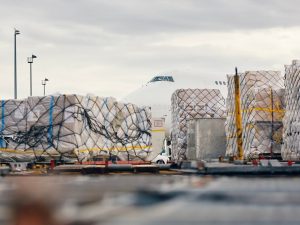Dinesh Krishnan, Chairman – Southern Region, ACAAI said, “At the Chennai cargo terminal, due to truck ramp and shed misalignment, the cargo gets wet while loading and unloading in the trucks. At the import shed although a canopy is provided the segregation is done outside and cargo gets wet. As soon as monsoon arrives, airport terminal operators ensure multiple roofing, check for leakage in pipes, water backlog which risks both import and export cargo. Monsoon is an annual event in India, so there’s no surprises if the cargo terminal operators paying attention to the ‘Monsoon Enabled’ terminal infrastructure in advance instead of the trade suffering due to wet cargo and then the CTO’s waking up to do patch work to fix the problems.”
Read More »‘LSPs must cover the trucks with layers of tarpaulin and plastic sheets durinng monsoons’
Sunil Kohli, MD, Rahat Cargo said, “Transportation during monsoons pose a great challenge to the handlers as how to protect the cargo from the possible damage hence as far as possible closed body vehicles need to be used for carrying the goods. The transport service providers also have to take additional precautionary measures by covering the truck with layers of tarpaulin and plastic sheets. The handlers also should be aware not to undertake outdoor loading or unloading of goods in severe weather conditions to ensure safety. With the onset of monsoon season bringing rains throughout the country, it becomes not only desirable but essential that required precautions are taken by the cargo handlers so that the boxes containing the contents do not get wet or damaged. Since rainy season has not been a new phenomenon in our country hence the handlers concerned are fully aware and trained as how to ensure a safe and secured packing of the cargo to avert any damage from rains. They are also well trained to load or unload cargo using covered platforms in a way that minimizes exposure to rains and potential damages.”
Read More »‘Teams must act quickly during sudden downpours or waterlogging scenarios’
Rajen Bhatia, Chairman Western Region, ACAAI said, “Airports and ground handling agents must roll out monsoon-specific SOPs to all airside and landside cargo teams before the season starts. Protective packaging and pallet wrapping are crucial. Handlers are trained to ensure cargo is shrink-wrapped, covered with tarpaulin and placed on plastic or elevated pallets to prevent contact with water on the tarmac or warehouse floor. Teams are given refresher training on how to act quickly during sudden downpours or waterlogging scenarios. Cargo movements from terminal to aircraft (or vice versa) are minimised during heavy showers or conducted using covered dollies and rapid transit vehicles. Handlers are equipped with monsoon gear (raincoats, boots, gloves) to ensure uninterrupted safe handling.”
Read More »‘Proactive planning must for high-value shipments to ensure safety’
Kamal Jain, Director, Cargomen Logistics said, “Monsoons bring added challenges to cargo handling, but with proper precautions, risks can be minimised. CTOs and agents should focus on waterproof packaging, secure palletisation and use of covered storage or transport to prevent cargo damage. Regular checks of terminal drainage, real-time weather monitoring and staff awareness are equally important. Transparent communication with customers about potential delays or diversions builds trust. Proactive planning, especially for sensitive or high-value shipments, is essential to ensure cargo safety during this season.”
Read More »HYD Air Cargo unveils CLIMB to boost freight forwarding
GMR Hyderabad Air Cargo proudly announces the official rollout of CLIMB – Cargo Loyalty Incentives and Milestone Benefits, India’s first dedicated loyalty program for freight forwarders. Following a successful soft launch during the ACFI Conclave in Hyderabad on January 31, 2025, the program will go live on July 1, 2025, with Hyderabad (HYD) as the pilot location. Developed exclusively for the freight forwarding community, CLIMB is a pioneering initiative across GMR-operated airports in India, designed to recognize and reward freight forwarders. The program offers a host of premium benefits, including: Priority cargo handling Dedicated single point of contact (SPOC) Demurrage waivers And more exclusive add-ons Loyalty Rewards With CLIMB, GMR aims to strengthen long-term collaboration, incentivize performance, and enhance stakeholder value across the air cargo ecosystem. This innovative loyalty program reflects GMR’s commitment to driving operational excellence and nurturing a future-ready cargo infrastructure in India.
Read More »Swiss WorldCargo completed the rollout of new fleet of lightweight ULDs
Swiss WorldCargo has completed the rollout of a new fleet of lightweight ULDs to help save fuel and emissions. The cargo division started to deploy the new ULDs around nine months ago and said the new units are 22 kg lighter for the AKE type and 20 kg lighter for the AKH type. The weight decrease translates into fuel savings of nearly 900 tons per year, and contributes to lowering CO2 emissions by approximately 2,770 tons per year, advancing the airfreight division’s goal to more sustainable cargo operations,” Swiss WorldCargo said in a press release. In addition, Swiss WorldCargo has recently replaced over 1,500 old PMC and PAJ pallets with brand-new versions. “We are very enthusiastic about our successful rollover to newer, lighter and more sustainable containers and pallets” said Miguel Seco, head of global business excellence at Swiss WorldCargo.
Read More »‘Speed, clarity, scalability crucial for logistics growth’
Nitin Navneet Tatiwala, Vice President of marketing, air network, and customer experience, Middle East, Indian Subcontinent, and Africa, FedEx said, “India’s logistics story today is defined by scale, speed and strategic clarity. As supply chains diversify and trade corridors shift, India is responding with clear intent. From PM Gati Shakti and the National Logistics Policy to digital-first reforms, India is laying the groundwork for a logistics system that is faster, smarter, and more sustainable. Despite global headwinds, merchandise exports crossed US$437 billion in FY24, and the country’s rise to 38th in the World Bank’s Logistics Performance Index reflects the depth of change underway. The growing footprint of FedEx in India mirrors this momentum — a quiet signal of the confidence global businesses place in India’s logistics future.”
Read More »SolitAir leases two B737-800Fs for global operations
SolitAir has signed an agreement for the lease of two Boeing 737-800 freighters for global operations. The airline has also launched new flights to Beirut and Kuwait, said an official LinkedIn Post. “We’re proud to announce the launch of our inaugural flight to Beirut, strengthening SolitAir’s commitment to providing faster, smarter, and more reliable cargo solutions,” said SolitAir. In addition to its network expansion, SolitAir has signed an agreement with World Star Aviation for the lease of two Boeing 737-800 freighters.
Read More »AAI inspects new locations to build 2nd greenfield airport at BLR
The Airports Authority of India (AAI) team is reportedly inspecting three locations on Kanakapura Road for building second greenfield airport in Bengaluru. AAI team is expected to submit a feasibility report within a month, according to Infrastructure Development Minister M.B. Patil. As per the reports, “Patil said that the AAI team inspected the locations, of which two were on Kanakapura Road and one on the Nelamangala-Kunigal Road. After receiving feedback from the AAI team, he said a feasibility report would be prepared followed by a detailed study which would be undertaken by expert consultants specialising in airport infrastructure development.”
Read More »Bhogapuram Greenfield Int’l Airport completes construction work
The Airports Authority of India (AAI) operated Bhogapuram Greenfield International Airport near Visakhapatnam, Andhra Pradesh has nearly completed its construction work and have entered the final stages. “With the air traffic control tower nearing completion, a calibration test was performed at Bhogapuram airport by the Director-General of Civil Aviation (DGCA) recently,” said reports. AAI conducted a trial run of the runway and signaling systems. After taking off, the aircraft hovered over the site for some time before heading to the sea. The initiative is seen to give a push to employment, regional cooperation and encourage India aim to become a global aviation hub. The Andhra Pradesh government is planning to make the aircraft-related work in the state conclude soon. Once the Bhogapuram airport gets operational, Visakhapatnam International Airport will be suspended.
Read More » Cargo Breaking News
Cargo Breaking News









